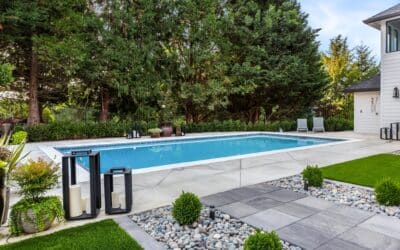You need the right-sized pool heater to keep your pool from getting cold. Finding the right pool heater requires considering many aspects, including your ideal pool temperature, the type of heater itself, and the size and shape of your pool. Once you understand these key factors, it’ll be that much easier to ease yourself into the water.
Sizing Your Pool Heater for Optimal Performance
The standard rule most pool owners know and follow is the bigger your pool, the bigger the heater you may need. To know exactly how big your pool is, you’ll need to calculate the total volume; the method will differ depending on its shape.
| Pool Shape | Volume Calculation |
| Rectangle/Square | Length X Width X Avg. Depth X 7.5 = Approx Volume |
| Round | 3.14 X Radius X Radius X Avg Depth X 7.5 = Approx Volume |
| Oval | 3.14 X Length X Width X 0.25 X Avg. Depth X 7.5 = Approx Volume |
| Kidney | (Width A + Width B) X Length X 0.45 X Avg. Depth X 7.5 = Approx Volume |
*Width A and B are the two longest widths of this pool shape |
| Irregular | Longest Length X Longest Width X Avg. Depth X 5.9 X = Approx Volume |
*Note:
- If your pool has a shallow and deep end, you must do the calculation twice (due to the difference in average depth).
- Calculations are multiplied by 7.5 or 5.9 because of the amount of gallons of water per cubic foot.
Calculating BTUs for Your Pool Heater
Once you know the volume of your pool, you can determine the BTUs required to heat it. BTU (British thermal units) is a unit of measurement that shows how much energy is used to heat or cool a given space. Depending on how often you need to heat your pool, you can determine which heater is optimal for using the correct amount and distribution of heat.
Sizing Your Pool Heater
When selecting the correct pool heater, you’ll need to consider the pool’s volume and other elements, such as your ideal pool temperature, regular air temperature, and how often you use your pool heater.
For example, it’s possible to select a heater with slightly more BTU than the volume of your pool requires if you would like to keep it at a higher temperature. However, installing a heater that uses much more BTU than necessary could damage your pool.
Choosing the Right Pool Heater Type
Gas and Propane Heaters
If you need a powerful heating solution to keep your pool warm regardless of the weather, gas and propane heaters are the best choice. They heat water quickly and maintain consistent temperatures, making them ideal for frequent swimmers or those who want instant warmth.
Electric Heaters
Electric heaters are a more energy-efficient option, especially when it comes to monthly operating costs. While they take longer to heat the pool compared to gas and propane models, they offer a steady and reliable way to maintain water temperature.
Solar Heaters
For an eco-friendly and cost-effective option, solar heaters are a great choice. While they don’t provide the same heating power as gas or electric models, they can help maintain comfortable water temperatures with minimal operating costs.
Conclusion
Selecting the right pool heater depends on several key factors, including volume, BTU standards, how warm you want your pool and how long you need it to stay heated. Each type of heater offers unique benefits, so it’s essential to choose one that aligns with your usage and budget.
To ensure accurate sizing and selection, we recommend that you consult with our professionals.


